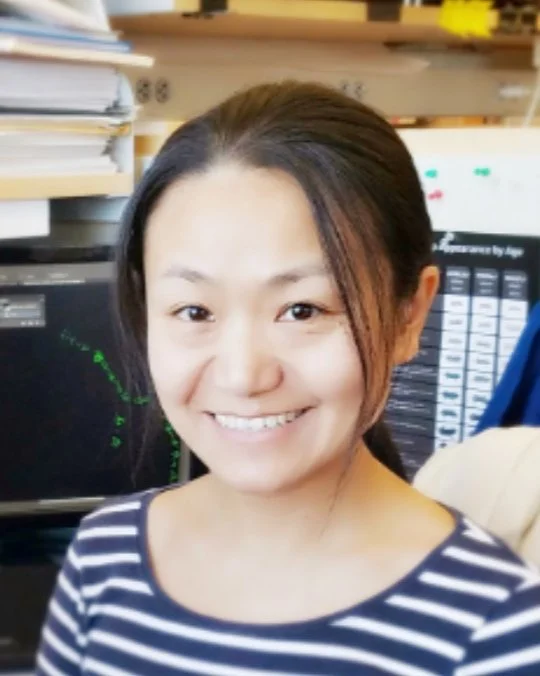Dr. Tingting Wang
Assistant Professor Georgetown University
Postdoctoral Fellow University of California San Francisco
PhD in Neurobiology Duke University
Dr. Tingting Wang is fascinated by the genetic and molecular mechanisms that control how cells communicate with each other. She is currently a PI at Georgetown University and reflects on her career path that brought her to where she is today.
In high school, she had a passion for mathematics, physics, and chemistry that she wanted to combine for her undergraduate studies. Biology was the perfect major, integrating each of these interests and allowing her to learn how cells communicate with one another. Signal transduction, pharmacology, and cancer biology were initially the focus of her scientific interests. That was, until she went to the movies with a friend to see The Matrix, in which human perception is modulated by a supercomputer. From this movie she became fascinated with how the rich information from our environment is processed and stored in the brain. Dr. Wang began her career in research as an undergraduate student in China. She studied protein folding, running western blots and purifying proteins. She was excited by newly developed cellular and molecular tools that could help her study how cells communicate on a synaptic level, so she sought out neuroscience PhD programs in the United States that had labs where she could pursue this research.
Dr. Wang joined the lab of Dr. Michael Ehlers at Duke University as a PhD student in the early 2000s. Dr. Ehlers studied long term potentiation, a form of learning within the nervous system where frequent activity results in additional receptors being trafficked to the synapse. Specifically, the lab studied how receptors are trafficked to the membrane of postsynaptic neurons. Newly synthesized receptors must travel a complicated path through the neuron toward their final destination of the synaptic zone of the plasma membrane - a remarkable feat considering that neuron structure is more complex than almost any other cell in the body! In her thesis project, Dr. Wang focused on understanding how the receptors are directed to the correct synapse in the postsynaptic neuron. She found that in neurons, but not other cells in the body, the endoplasmic reticulum forms a sort of reservoir for new receptors to diffuse to the right synapse.
Throughout conducting her PhD research, she became curious about how individual genes might regulate this process of receptor trafficking. To explore the world of genetics, Dr. Wang’s next career step took her to the West Coast to work in the lab of Dr. Graeme Davis at the University of California San Francisco. As a postdoctoral fellow, she was still interested in studying synaptic plasticity, with a particular focus on homeostatic plasticity. An organism must be able to control plasticity to prevent one region from becoming over- or under-active. She began working with Drosophila melanogaster (fruit flies) to perform large scale genetic screens to understand which genes may contribute to this plasticity control. She also wanted to know how post and presynaptic cells communicate to maintain homeostatic plasticity. Tingting started by blocking postsynaptic glutamate receptors. This led the presynaptic neuron to compensate for the reduced glutamate intake on the postsynaptic side with increased neurotransmitter release from the presynaptic side. However, this implies that there must be some retrograde signaling from post to presynaptic cell to activate this compensatory process. She ultimately found that extracellular matrix molecules are important for this communication, but she was shocked to find it was secreted from glial cells rather than the postsynaptic cell. This triad of cells (pre-synaptic neuron, post-synaptic neuron, and glial cell) together regulate homeostatic plasticity and form the so-called “tripartite synapse”, which has become the focus of her own lab’s research.
Dr. Wang moved to Georgetown University and opened her lab in the Department of
Pharmacology and Physiology. She focuses on how glial cells regulate homeostatic plasticity, especially in diseases such as epilepsy, Alzheimer’s Disease, or conditions like Autism Spectrum Disorder. Her lab uses transcriptomic and electrophysiological methods to understand which genes are regulated in glia. Now, she finds that the most challenging, but also the most rewarding, aspect of her career is teaching and mentoring her students. As a PI, she strives to create an environment in her laboratory and classes that is open and accessible to anyone interested in the research. She develops a training plan that is unique to each individual trainee, tailored to their needs and skills.
Dr. Wang still likens the central nervous system to a computer, and discusses this idea with her electrical engineer husband. They often talk about things that we can learn from the engineering world about neural circuits on a cellular and even synaptic level. Outside of the lab, she likes to paint, hike, bike, and explore the museums around Washington D.C., but she acknowledges that these hobbies require more time than she often has in her busy schedule. She has been able to take time to travel with her family, and recommends that everyone go to Mount Everest one day! Her future plans include seeing the “mysterious” lands of Egypt, mentoring her trainees, and perhaps discovering how much the reality of neurobiology might resemble The Matrix.
Find out more about Tingting and her lab’s research here.
Listen to Chiaki’s full interview with Tingting below!



